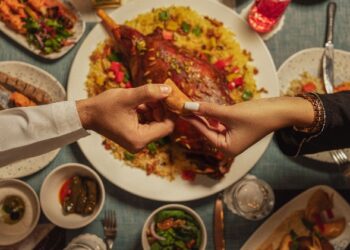Pierchic, a venue that operates under the Jumeirah Restaurant Group is nothing short of an iconic destination for both residents and tourists alike. Whether it be celebrating a milestone or taking advantage of the scenic views from the restaurant, Pierchic is renowned for offering something different from the busy Dubai life and Mahak Mannan spoke with Luca Gagliardi, general manager, Pierchic on how he plans to add food to that equation.
 Sustainability is an aspect every entity and individual today is trying to achieve, whether it is being eco-friendly or going back to basics. In the food and beverage market, being sustainable of late has been a lot about doing away with single use plastic, a route which Jumeirah Restaurant Group has also collectively taken, however, Luca Gagliardi, general manager, Pierchic explains a completely different side of sustainability in the restaurant market.
Sustainability is an aspect every entity and individual today is trying to achieve, whether it is being eco-friendly or going back to basics. In the food and beverage market, being sustainable of late has been a lot about doing away with single use plastic, a route which Jumeirah Restaurant Group has also collectively taken, however, Luca Gagliardi, general manager, Pierchic explains a completely different side of sustainability in the restaurant market.
“Very few restaurants have survived as long as Pierchic has and when I came in last year in May I thought of giving this restaurant a reason behind why it is still standing,” Gagliardi says.
Location is an important aspect, the scenery that you get here and the idea of it as a destination has worked well. A lot of people come here to propose, so we have a lot of anniversaries and milestone celebrations. There are a lot of reasons for this restaurant to be alive but none of them revolved around food.
“We have this beautiful structure and people come here to support us and we don’t give them a reason to come back with the essence of food and beverage, this is what I wanted to change, to give people the opportunity to enjoy the food and beverage aspect of this restaurant as much as everything else.”
The one major change that Gagliardi has brought about after taking the reigns at Pierchic is ensuring the source sustainable produce.
“We are looking for producers and suppliers who will give us real product because there is a big difference between a commercial product and a real product. If you go in a restaurant in Dubai and order a sea bass, you will get a 1kg seabass. You will not find a 2kg seabass because a 1kg seabass comes from a non-sustainable farm. As soon as the sea bass reaches 1kg they are caught and sent into the market,” he explains.
“When it is a line caught fish, and you come across a 1kg seabass, you throw the fish back in the sea. You cannot sustain the future generations this way and fishermen know if you catch a small fish, they will not be able to reproduce. That’s what we call sustainability. It is something that we and the next generation can enjoy. These are the kind of sustainable products we are looking for, but it is very difficult to find it here because Dubai does not have a lot of demand for it.
“Let’s take another example of a cheesecake, in most restaurants, 99% of the cheesecake is Philadelphia, an industrial product. I went inside our kitchen and removed all of it, went to Sharjah and found a person who skims his own cream cheese for us. It is all about education, not just within the team but with our clients as well. People here do not like natural wine but if you believe in it all you have to do is put natural wine on your menu and when people come in you need to explain to them what is on offer.”
However, being sustainable does not come easy, especially in terms of cost, according to the general manager.
“Being sustainable is more expensive when you start because you have to adapt and make changes but as you continue it, it becomes easy because you know how and where to deal with for your products,” he says.
“Fresh products have a shelf life of four days as compared to three days of industrial product. From that point of view, it is more cost effective because I have an extra day to sell the product.”
Pierchic is considered a high-end restaurant in terms of pricing and due to this, the company had to cut down on its profit margins while making the shift to sustainable produce.
“This restaurant needs to be expensive, we cannot be cheap because the maintenance of the restaurant is very high. Here we must change the floor and base because of the salt, there are cables underneath and a lot of other factors like these. We were already expensive so when we went up with our food cost our margins needed to come down. We still make profit but not as much as we did before. This is why I want to give our guests a reason to justify the cost as well,” he adds.
“We have been explaining our menu to our clients for a year now and have to be very careful with is because sometimes they are shocked. The perception of our clients of what we do here is becoming something beyond normal customer relations. They want to know where we get our bread from, which takes seven days to ferment, and why we choose to use the products we do. Sometimes they ask me to meet them separately because they want to discuss it in detail. This is what we want to build at Pierchic and will continue doing so.”


































































